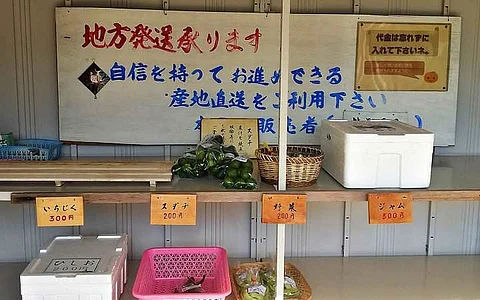
- NEWS
- the EDIT
- COMMENTARY
- BUSINESS
- LIFE
- SHOW
- ACTION
- GLOBAL GOALS
- SNAPS
- DYARYO TIRADA
- MORE

In Japan, where vending machines are ubiquitous and convenience is key, a traditional yet impactful concept is making waves in the fight against food waste: honesty stores. These unmanned roadside stalls, where customers take what they need and leave payment in a collection box, have been a staple of rural Japan for decades. Today, their presence is expanding into suburban and even urban areas, offering a fresh approach to sustainability and mindful consumption.
Originally, these stalls emerged as a way for small farmers and home gardeners to share their surplus produce. Instead of letting vegetables go to waste, they placed them at self-service stands, trusting buyers to pay fairly. Over time, the concept gained traction, becoming an accepted and appreciated part of daily life.
In contrast to traditional supermarkets, honesty stores operate on a simple, cost-effective system. Farmers and local residents stock the stalls with fresh, seasonal produce daily. Customers, in turn, pick their items and deposit the correct amount into an unattended cash box. Some stands even offer cashless payment options to modernize the process while maintaining the store's core principle, trust.
As Japan continues its efforts to cut down on food waste, honesty stores are playing a crucial role in tackling the issue at a grassroots level. The Ministry of Agriculture, Forestry, and Fisheries recently reported that food waste in Japan dropped to 4.72 million tons in fiscal 2022, exceeding the government's target reduction. While large-scale corporate initiatives have contributed to this progress, community-based solutions like honesty stores offer a sustainable, everyday alternative.
These stalls help prevent food loss by providing an outlet for produce that may not meet supermarket standards but is still perfectly edible. Slightly misshapen vegetables, irregularly sized fruits, or excess harvests that would otherwise be discarded find a second chance on honesty store shelves. Additionally, customers get access to fresh, affordable produce at a fraction of retail prices, encouraging them to buy only what they need.
The success of stores reflects Japan’s deep-rooted culture of trust and community responsibility. Unlike other retail settings that rely on strict inventory control and surveillance, these self-service stands function purely on the honor system. Theft and misuse are rare, reinforcing the belief that people will act honestly when given the chance.
In urban areas, innovative adaptations of this model are emerging. Some unattended stores have begun offering not only fresh vegetables but also packaged goods nearing their expiration dates, further reducing waste. Others incorporate technology such as security cameras and digital payment systems to enhance convenience while maintaining the core values of transparency and trust.
The honesty store concept presents an opportunity for the Philippines to combat its own food waste challenges. In many rural and urban areas, excess produce from small-scale farmers often goes unsold due to market oversupply or aesthetic imperfections. By implementing honesty stores, communities can provide a direct outlet for these goods, ensuring that perfectly edible food does not go to waste.
Filipino culture, known for its strong sense of community and bayanihan (the spirit of communal unity), aligns well with the principles of honesty stores. Establishing these stalls in barangays and public spaces can encourage responsible consumption while offering affordable, fresh produce to locals. Furthermore, honesty stores can serve as a platform for raising awareness about food waste reduction and sustainable living.
With proper support and awareness, honesty stores could become an effective grassroots solution in the Philippines, benefiting both farmers and consumers while contributing to national food security and sustainability.
As Japan moves toward a more sustainable future, the honesty store concept serves as a reminder that small, community-driven efforts can make a significant impact. By giving excess produce a second life and promoting conscious buying habits, these simple stalls are helping reshape how people think about food consumption.
For visitors to Japan, stumbling upon an honesty store is a unique experience — a blend of tradition, sustainability, and local charm. Whether tucked away in a countryside village or nestled in the suburbs of a bustling city, these stalls offer a rare opportunity to embrace Japan's commitment to reducing food waste, one vegetable at a time.
